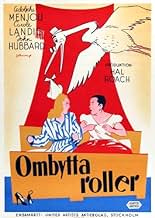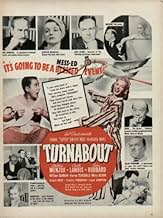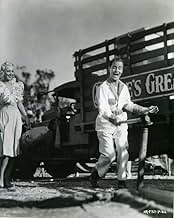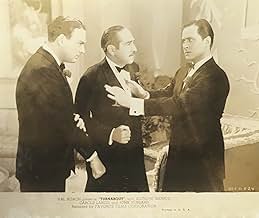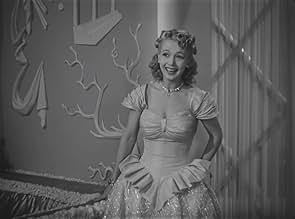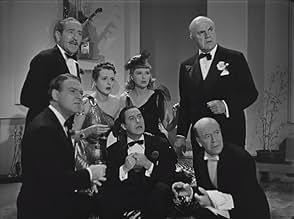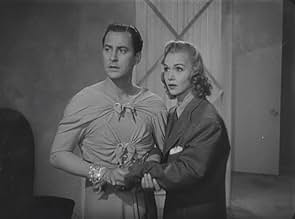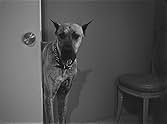AVALIAÇÃO DA IMDb
6,1/10
825
SUA AVALIAÇÃO
Adicionar um enredo no seu idiomaBickering husband and wife Tim and Sally Willows mutter a few angry words to a statue of Buddha and wind up living each other's life.Bickering husband and wife Tim and Sally Willows mutter a few angry words to a statue of Buddha and wind up living each other's life.Bickering husband and wife Tim and Sally Willows mutter a few angry words to a statue of Buddha and wind up living each other's life.
- Direção
- Roteiristas
- Artistas
Avaliações em destaque
"Turnabout" is a moderately amusing comedy whose central premise a husband and wife are supernaturally put inside each other's bodies and she has to negotiate his work world while he has to endure the boredom of stay-at-home wifehood could have been the basis for a much better movie than we have. Producer-director Hal Roach had previously used the gimmick in a much funnier two-reeler starring Charley Chase, "Okay, Toots!," in 1935, and he got the plot of "Turnabout" from a novel by Thorne Smith, whose "Topper" stories had previously made him a lot of money. Though hampered by a low-voltage cast (the actors playing the couple, Carole Landis and John Hubbard, meant so little in 1940 Adolphe Menjou, in the supporting role of the husband's business partner, got top billing) and the fact that the movie is already almost half over before the actual turnabout occurs, it's still a nicely amusing comedy from a bunch of professionals who knew how to make people laugh but imagine how good it could have been with the "Topper" stars, Constance Bennett and Cary Grant, in the leads!
Although not a great film this is never the less, in its own way, unforgettable. The first section of the film plays as a light comedy and is amusing enough. As soon as the gender reversal fun begins, however, it moves into a different league - one which startles by the casual way it plays with sexual expectations and stereotyping.
The Willows' transformation (through the creaky genie device) is potentially explosive stuff and, to his credit, Roach successfully steers an innocent course between pantomime and farce. Although the sexual naivety of the film is obvious, to modern eyes the homosexual/lesbian resonance of the scenario is still very funny and, for its time, I think rather daring. Hubbard's fey alter ego especially is a joy to behold, and I am surprised that this film is not better known to lovers of gay camp.
Some elements of the supporting plot reinforces the echoes of sex and gender play too: the mix up with the pets for instance, prefiguring later confusions over role, or Willows' over-aggressive personal trainer, whose grappling is suggestive of an unwanted sexual encounter. Even the running joke of hiding drink from the wife suggests a furtive vice, again particularly apposite in context.
Menjou and Landis lend a touch of class to the proceedings, and although studio-bound, and not particularly realistic in scale, the set design is elegant and spacious. The otherwise (to me) unknown John Hubbard reminds me of Ed Wood in Glen or Glenda - it's that sort of film, where men slip on Angora sweaters and then light a pipe.
This is a project that is more successful exactly because it is directed by comedy veteran Roach. It would have perhaps emerged as a far safer, and therefore far less enjoyable vehicle in the hands of a larger studio or, if made by a director with a different background.
The Willows' transformation (through the creaky genie device) is potentially explosive stuff and, to his credit, Roach successfully steers an innocent course between pantomime and farce. Although the sexual naivety of the film is obvious, to modern eyes the homosexual/lesbian resonance of the scenario is still very funny and, for its time, I think rather daring. Hubbard's fey alter ego especially is a joy to behold, and I am surprised that this film is not better known to lovers of gay camp.
Some elements of the supporting plot reinforces the echoes of sex and gender play too: the mix up with the pets for instance, prefiguring later confusions over role, or Willows' over-aggressive personal trainer, whose grappling is suggestive of an unwanted sexual encounter. Even the running joke of hiding drink from the wife suggests a furtive vice, again particularly apposite in context.
Menjou and Landis lend a touch of class to the proceedings, and although studio-bound, and not particularly realistic in scale, the set design is elegant and spacious. The otherwise (to me) unknown John Hubbard reminds me of Ed Wood in Glen or Glenda - it's that sort of film, where men slip on Angora sweaters and then light a pipe.
This is a project that is more successful exactly because it is directed by comedy veteran Roach. It would have perhaps emerged as a far safer, and therefore far less enjoyable vehicle in the hands of a larger studio or, if made by a director with a different background.
Bickering husband and wife (John Hubbard, Carole Landis) have their minds switched thanks to a magic statue they call Mr. Ram. Landis is gorgeous, funny, and the primary reason to recommend this movie. Hubbard is OK but nothing special. The supporting cast includes Donald Meek, William Gargan, Franklin Pangborn, and Marjorie Main. Solid supporting actors all. Mary Astor appears in a wasted role as a friend of Landis' before The Maltese Falcon would reinvigorate her career the following year. Adolphe Menjou is annoying as a partner in the husband's ad agency. His entire role in the movie is yelling at various people. It gets old fast.
The madcap stuff doesn't really get underway until about midway through. The first 35-40 minutes is mostly setup, establishing these two characters' personalities and relationships. This probably could have been trimmed down to 10-15 minutes and I believe it would have helped the movie considerably. Everything involving the dog and then the bear was completely irrelevant and seemed to be tacked on because someone thought "Hey! Animals are funny. Let's do that." The first half is a slog to get through but the second half is lots of fun. I saw it years ago and didn't like it but just saw it for a second time and came away with a more favorable opinion. It's a very unique and risqué film for 1940. Carole Landis fans will love it most. It's probably her best role.
The madcap stuff doesn't really get underway until about midway through. The first 35-40 minutes is mostly setup, establishing these two characters' personalities and relationships. This probably could have been trimmed down to 10-15 minutes and I believe it would have helped the movie considerably. Everything involving the dog and then the bear was completely irrelevant and seemed to be tacked on because someone thought "Hey! Animals are funny. Let's do that." The first half is a slog to get through but the second half is lots of fun. I saw it years ago and didn't like it but just saw it for a second time and came away with a more favorable opinion. It's a very unique and risqué film for 1940. Carole Landis fans will love it most. It's probably her best role.
Although Adolphe Menjou is billed first, the "Turnabout" stars are John Hubbard (as Tim, then Sally) and Carole Landis (as Sally, then Tim); they play a bickering couple who are granted a wish: they switch bodies! There are some stereotypes evident, but this is a surprisingly well-done comedy from the time period. Possibly, the most "offensive" bit is not the gender role playing, but the repeated bit involving Mr. Menjou and the water fountain. Donald Meek (as Henry) and Marjorie Main (as Nora) are delightful as servants to the gender-bending couple. Mr. Hubbard and Ms. Landis are funny and believable. The ending is a trifle weak; but, "Turnabout" is an enjoyable surprise.
****** Turnabout (1940) Hal Roach ~ John Hubbard, Carole Landis, Adolphe Menjou
****** Turnabout (1940) Hal Roach ~ John Hubbard, Carole Landis, Adolphe Menjou
Goodness knows whats happening in Rocky River Idaho... They must have had a humour extraction... Probably something in the water... This film is a howl... How it hasn't been rediscovered is amazing... United Artists apparently have the rights... Get it out on DVD guys... THIS IS A CAMP CLASSIC... Having all the good and bad points that a film that falls into that catagory needs... Now carefull what you wish if you have bedroom statuary
Você sabia?
- CuriosidadesPolly Ann Young, who plays Miss Twill, is the older sister of film star Loretta Young.
- Erros de gravaçãoWhen the woman's personality is in the man's body and the actor in the part shows this with female reactions and gestures, he looks at his fingernails by holding his hand palm up and bending the fingers toward himself. This is the way a man, not a woman, regards their fingernails, and it often appears in fiction as one way by which a man dressed as a woman is caught out. Women study their fingernails by holding a hand palm down and extending the fingers so that they are flat with the rest of the hand.
- Citações
Sally Willows: Now listen to me, Tim Willows, the situation with this dog of yours has gone entirely too far. He goes to a kennel tomorrow or I go!
Tim Willows: Darling, you wouldn't have much fun in a kennel.
- Trilhas sonorasMargie
(1920) (uncredited)
Music by Con Conrad and J. Russel Robinson
Lyrics by Benny Davis
Sung by a chorus on radio with modified lyrics
Principais escolhas
Faça login para avaliar e ver a lista de recomendações personalizadas
- How long is Turnabout?Fornecido pela Alexa
Detalhes
- Data de lançamento
- País de origem
- Central de atendimento oficial
- Idioma
- Também conhecido como
- Turnabout
- Locações de filme
- Empresa de produção
- Consulte mais créditos da empresa na IMDbPro
- Tempo de duração
- 1 h 23 min(83 min)
- Cor
- Proporção
- 1.33 : 1
Contribua para esta página
Sugerir uma alteração ou adicionar conteúdo ausente

